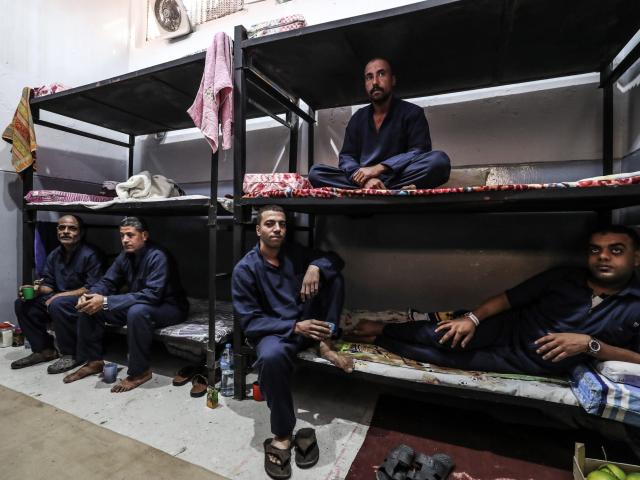
Egypt: UN Universal Periodic Review Must Highlight Systematic Human Rights Violations in Torture, Enforced Disappearances, and Unfair Trials
Press Release
The undersigned organizations express deep concern over the systematic and widespread use of torture, other ill-treatment, enforced disappearances, arbitrary detention, unfair trials, and appalling detention conditions in Egypt. These violations reflect a deliberate pattern enabled by state policies and legal frameworks that shield perpetrators from accountability. This systemic impunity undermines the rule of law, fosters recurring violations, and perpetuates injustice.
In July 2024, the undersigned organizations submitted a detailed report on these violations to the UN in advance of Egypt’s Universal Periodic Review (UPR) scheduled for January 2025. The UN’s subsequent ‘summary of stakeholder submissions’ echoed the report’s key concerns, including the authorities’ failure to amend the Penal Code’s definition of torture or establish an independent investigative body. The UN’s summary report also reflected the joint report’s recommendation for Egypt to provide effective compensation to survivors and their families.
The joint report urged the abolition of exceptional courts, such as terrorism courts and the Supreme State Security Emergency Court. It also provided a comprehensive account of human rights violations in Egypt over recent years, with a focus on the following issues.
-
Torture: Torture is systematically practiced on a large scale in Egypt, with methods including electric shocks, threats, sexual violence, and physical and psychological abuse. Often used to extract confessions or punish dissent, these practices constitute crimes against humanity due to their widespread and systematic nature and their persistent perpetration against Egypt’s civilians.
-
Enforced Disappearances: Egyptian authorities use enforced disappearances as a tool to silence dissent. Victims are arrested without warrants, held in secret locations, and denied contact with their families or lawyers. Many face prolonged disappearances, with some eventually released after enduring torture, while others remain missing.
-
Unfair Trials: Trials, particularly those involving political opposition or national security cases, are routinely marred by unfair practices. Authorities use tactics like “case recycling,” where detainees face new charges after their initial detention expires, ensuring indefinite custody and depriving them of fundamental rights.
-
Prison Conditions: Severe overcrowding, inadequate medical care, and poor hygiene characterize Egypt’s detention facilities. These conditions have led to deaths from medical negligence and are designed to weaken detainees physically and psychologically, violating fundamental rights.
These persistent features of the Egyptian government’s ongoing crackdown have created an enduring human rights crisis. Despite repeated international recommendations, there has been no meaningful progress to tackle torture, enforced disappearances, and arbitrary detention. Instead, authorities have adopted superficial initiatives like the National Human Rights Strategy, which fail to meaningfully address the human rights crisis and its root causes.
Accordingly, the undersigned organizations call on UN Member States to make the following recommendations to Egypt during its 4th Cycle UPR:
-
Reform laws, including the Emergency Law, Penal Code, and Criminal Procedure Code, to align with Egypt’s international human rights obligations.
-
Repeal the Counter-Terrorism Law and abolish exceptional courts, such as the Emergency Supreme State Security Courts and Terrorism Circuits Courts.
-
End all forms of torture and practices which enable torture including incommunicado detention, prolonged pre-trial detention, case recycling and enforced disappearance.
-
Ensure prisoners’ rights to family visits, medical care, and adequate legal representation.
-
Require the National Security Agency and National Police to maintain accessible and transparent detention records.
-
Reject confessions obtained under torture, and halt judicial proceedings if torture or ill-treatment is suspected.
-
Ensure prison and forensic doctors operate independently and follow international standards.
-
Conduct prompt, independent and impartial investigations into all allegations of torture with a view to bringing those responsible to justice, and provide survivors of torture and their families with effective and timely reparations.
-
Ratify the Optional Protocol to the Convention against Torture
-
Implement recommendations from international and regional human rights bodies, including the UN Human Rights Committee, UN Committee against Torture, and the African Commission on Human and Peoples’ Rights.
-
Extend a standing invitation for country visits by UN Special Rapporteurs, including the Special Rapporteur on Torture and Other Cruel, Inhuman or Degrading Treatment or Punishment and allow her to meet detainees, victims, and civil society groups, and monitor compliance with human rights standards.
The undersigned organizations stress that comprehensive reforms are urgently needed to address these systemic violations and create an environment where justice, accountability, and human rights can thrive in Egypt.
Signatory Organizations:
-
Committee for Justice (CFJ)
-
Danish Institute Against Torture (DIGNITY)
-
Egyptian Commission for Rights and Freedoms (ECRF)
-
Egyptian Front for Human Rights (EFHR)
-
Egyptian Initiative for Personal Rights (EIPR)
-
El Nadeem Center for Victims of Violence and Torture
-
Middle East Democracy Center (MEDC)
-
REDRESS



